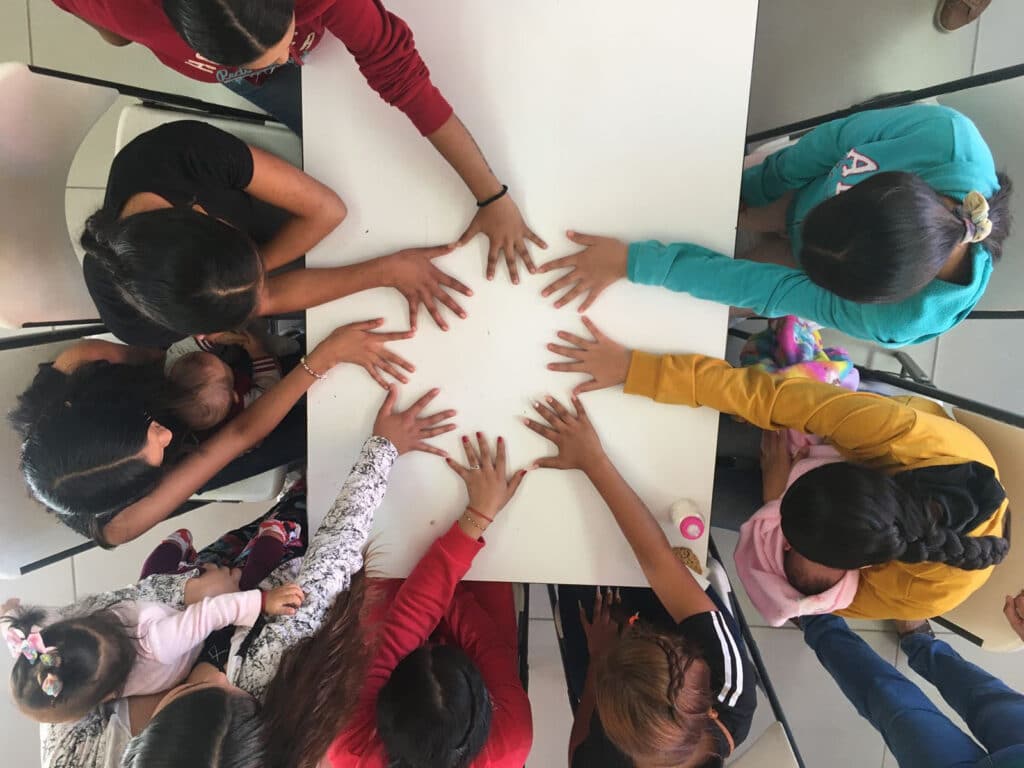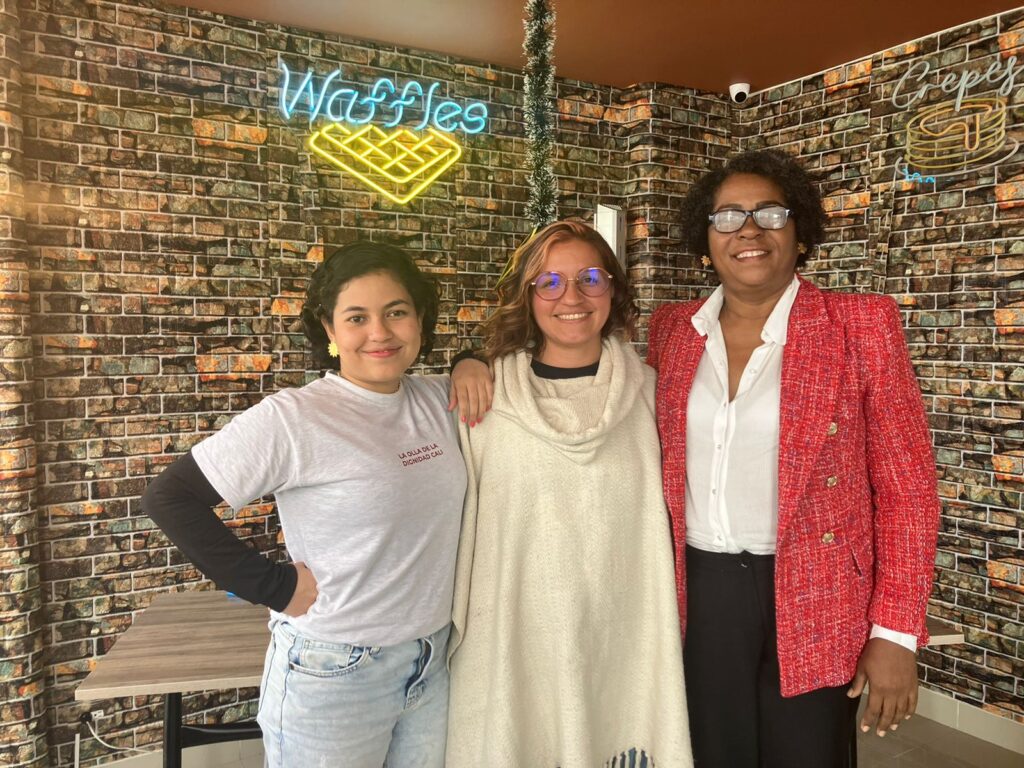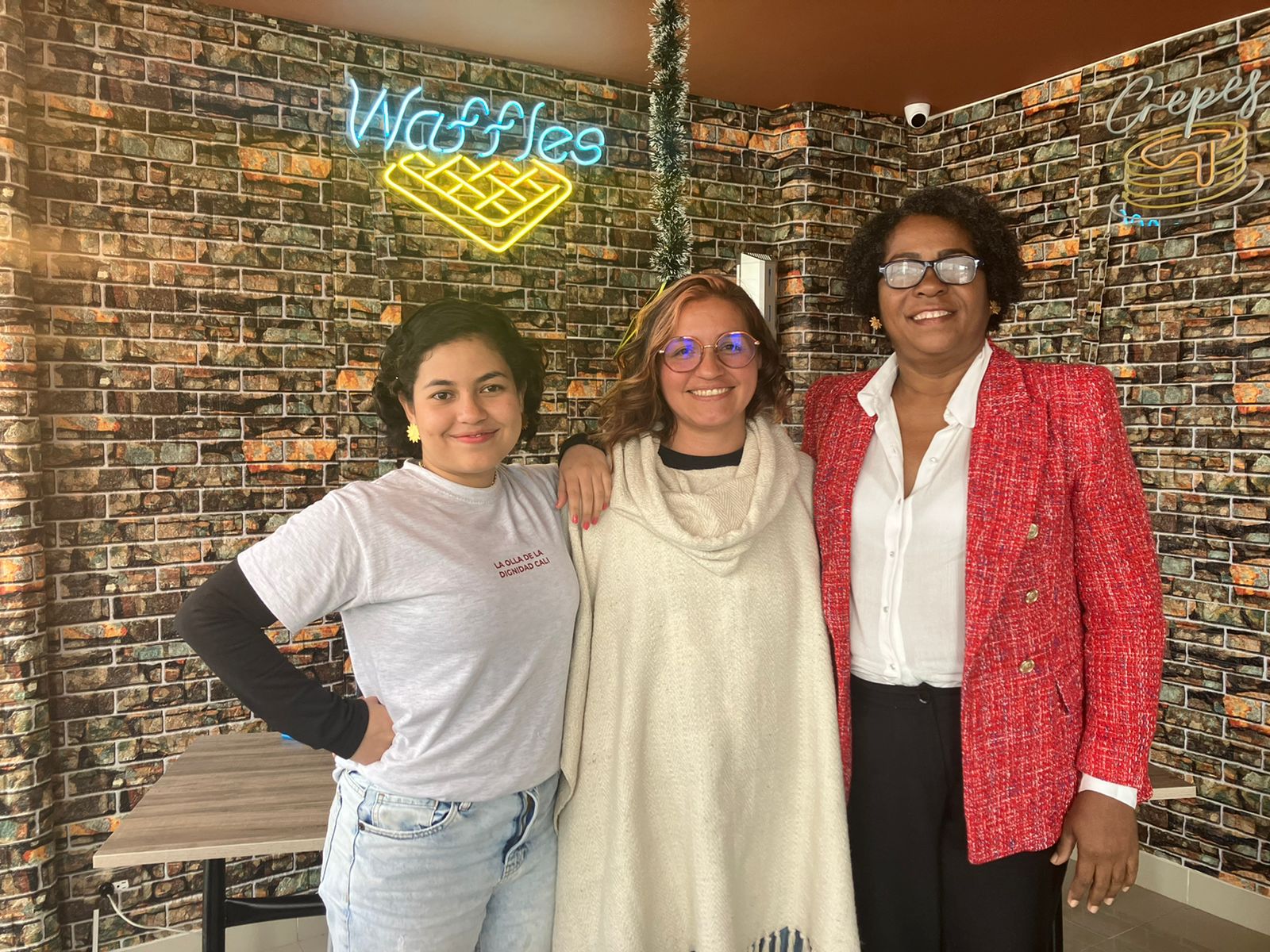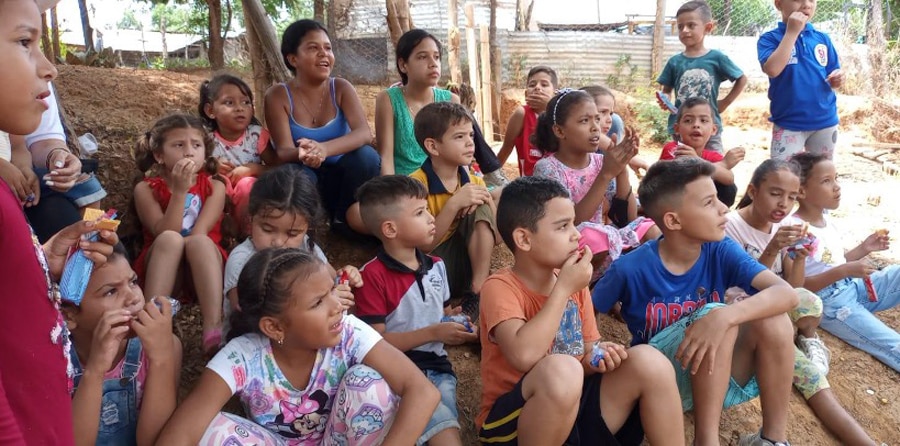Celebrating the Graduation of the 2022 Goldin Global Fellows Spanish Cohort
Creating an accessible leadership program for Spanish-speaking grassroots leaders

On December 10th we celebrated the graduation of the first Goldin Global Fellows program in Spanish language, where 17 Spanish-speaking grassroots leaders from eight countries in Latin America and Europe came together to create a new community of practice.
Since 2018, we've held onto the dream of offering the Fellows program in Spanish. True to Goldin Institute’s principles of ensuring that resources and connections are accessible to as many grassroots communities around the world as possible, offering the program in Spanish has long a priority for our whole team. Removing language barriers -- which included translating the curriculum, readings and videos in the GATHER Platform from English to Spanish -- was not an easy process. But I can say the effort to offer this course in Spanish has been worthwhile, especially for me as a Spanish-speaking activist who has been able to find a community who speaks in my native tongue and who are also working on both similar and different issues.
“Gather is knowledge and collective construction.” -- Luis Alomia, Colombia
During the recruitment process we counted on our Alumni, friends and colleagues from Colombia and Latin American countries to help us share the news of the application and spread the word. We were delighted to receive applications from a diverse group of grassroots leaders from over 10 countries that crossed many divides in our society, bring together youth and elders, leaders from rural places and main cities, victims of violence and former combatants. Together, these individuals represented a wide range of sectors, including environment, law, education, technology, peace and reconciliation, arts, memory, sports, theater, and more.
“Gather is a before and after of my leadership. I am happy since they contributed to broaden my vision and knowledge that will help me to build solutions that can be lasting over time and see communities as a treasure of active resources and that will be an example of good practices for other communities that want to join the transformation”. -- Natasha Duque Torres, Venezuela
It was truly a very diverse group, each doing beautiful work individually, but tied together by the common bond of being leaders on the front lines where life revolves around changing their communities and finding solutions every day. From these applicants, we selected 17 individuals who became the first Spanish-speaking cohort.
As a facilitator I was impressed when talking with our Fellows about the learnings and concepts delivered in the program, and realized how their perspectives and ideas about their community and social-change work had begun to develop and adapt. Indeed, they became more aware that new solutions had to be based on all the assets they always had but may not have seen in their communities. It was also moving to see how they started imaging a new understanding of leadership which counts on the whole community, giving opportunities to those often left behind. I was further impressed at how sensitive they became; in our conversations we sometimes cried noticing the changes they were going through and how new concepts gave them a vision of collectiveness.
"Gather has allowed me to broaden my horizons as a social leader by identifying and valuing resources and assets that we have as a community, as well as empowering the leadership of my colleagues based on the recognition of their individual strengths and interests in community work." -- Diana Rocio Gomez Torres, Argentina
Fellows felt that the course on the GATHER Platform was different from other courses because they had a strong sense of support from the Goldin Institute team and meaningful relationships with their peers.
It’s like a family that we can always count on, no matter what.
In our roundtable “Reflections and Critical Moments” one of the most broadly shared reflection was that the Fellows felt like they were not alone in this program, knowing there were other leaders around the world doing the same and learning alongside them. For example, Ernst from Haiti would tell us about the challenging times facing the Haitian population due to the political situation in his country, or Eva in Argentina would share that she faced many struggles for raising her voice against state violence. We also exchanged positive and happy stories too, for example Manuella shared about her journey from Quibdo (Colombia) to Spain to talk about how successful her project about football was there, or Nuria from México who got to be involved in a project to protect underage pregnant girls. We also had Martha from Guapi (Colombia) who graduated from her specialization during the Fellows program and Arturo from Bogota (Colombia) and his “Picaditos” Football matches with youth when they launched their book “La Prisión que Jamás me Contuvo” written by a former combatant. All of us looked forward to meeting each Saturday where we shared beautiful moments with each other during our weekly GATHER Roundtables.
“Gather is a seedbed in which the strengths, abilities and natural gifts of leaderships are brought out.” -- Geiner Arrieta, Colombia
So when the Program came to an end, Fellows wanted their graduation to be like a party; a celebration of life, cultures, learnings, our individuality and how this makes sense in community. Fellows celebrated with drinks from their territories, showing off their typical customs or any other item that represented them. We also had a freestyle performance by Johnathan, and a video of some musicians and dancers from the region where one of our youngest fellows, Luis Alomia, is from.
“My Gather experience has helped me to see that the actor of change that I want to be requires the participation of everyone in my community. Having grown up in a society where exclusion is the norm, Goldin has given me the necessary tools to be a true agent of change by collaborating with others and identifying our resources to be able to dream big together”. -- Ernst Djeride, Haiti
I have to say the best part of the celebration was the desire of Fellows to talk about the future and their optimism for new collective projects. They want to move forward, grow, and build together. Fellows Manuela and Arturo proposed four lines of work for Fellows in 2023:
-
- Creating a shared asset map with the purpose to realize a meeting of sharing vision. To have it real, we need a plan to know what we have, what can we do to meet us face to face together and develop our community visioning summit.
- Monthly meetings where each person of this cohort can lead one of the meetings.
- A directory of all the members of the Alumni network with their strengths and special topics and projects where they work.
- Participate in all the workshops set up by the Goldin Institute so we can learn, meeting new people and collaborate in new projects.
- We can share our networks, follow each other, and get to know what each one is doing, as well as and distribute what others are doing, including Goldin Institute’s social networks.
- We need help from the Goldin Institute to present our projects in case we need representation.
"Gather has given me the chance to meet my community again, open up to new listening, in order to collaborate on the paths we are charting together”. -- Nora Gabriela Fuentealba Rivas, Chile
And now, Fellows faithful to the principles they learned during the Goldin Global Fellows program wanted to remove barriers of distance so some of them made the efforts to meet with each other in person!

“As you may know this is the 20th birthday of Goldin Institute and I can’t think of a better way to celebrate our 20th anniversary than by welcoming you into our Global Family, congratulations to all of our new graduates on behalf of the Goldin Institute, and especially, on behalf of Diane Goldin, the Founder and Board chair of the organization.” - Travis Rejman, Executive Director of the Goldin Institute
Peace Day activities from South America
By Lissette Mateus Roa, Co-Facilitator, Goldin Global Fellows
In 1981, the United Nations declared that September 21 would be observed as the International Day of Peace, devoting the day to ‘commemorating and strengthening the ideals of peace within and among all nations and peoples’. Now, the day is observed worldwide with many grassroots leaders and activists using it as a day to promote their activities and causes. Our 2022 Global Fellows (Spanish Edition) have been doing just that, by utilizing this opportunity to engage with their communities, peers, politicians, and civil society groups to further messages and actions around peace and healing. See what some of them have been up to below.
En 1981, las Naciones Unidas declararon que el 21 de septiembre sería señalado como el Día Internacional de la Paz, dedicando el día a “conmemorar y fortalecer los ideales de paz dentro y entre todas las naciones y pueblos”. Ahora, el día es celebrado en todo el mundo por muchos líderes y activistas de base que lo ven como un día para promover sus actividades y causas. Nuestros Global Fellows 2022 (edición en español) han estado haciendo exactamente eso, al utilizar esta oportunidad para interactuar con sus comunidades, pares, políticos y grupos de la sociedad civil para promover mensajes y acciones en torno a la paz y la sanación. Vea lo que algunos de ellos han estado haciendo a continuación.

Peace agreement progress in Colombia
By Geiner Alfonso Arrieta Hurtado, Goldin Global Fellow from Colombia
For the International Day of Peace, I participated in a discussion on the commemoration of the 5 years of Colombia’s Peace Agreement organised by ONU and Conversa Foundation at the National University of Colombia, in La Paz Cesar. The Peace Agreement in Colombia, signed by the FARC-EP and the national government, yielded great expectations for Colombians to make our dream of total peace come true once and for all. That hope was ongoing for six years, starting with the dialogues in 2012 until the sign off day on Nov 24th 2016. It gave us optimism for the new generations for whom we do not want to inherit the same fifty years of sadness which we endured due to the armed conflict. All those who signed off on the peace agreement believe in stopping the armed struggle and share a desire to see democracy within our politics. We strongly trust in peace in territories where the will of doing things better is present in governors, institutions, and population.
Therefore, it is necessary to stop systematic murders to affected population, social leaders, and peace agreement signatories. Peace is not just about the ceasefire and halting shooting, but it is about personal wellbeing too.

En el Día Internacional de la Paz, participé en un conversatorio sobre la conmemoración de los 5 años del acuerdo de paz en Colombia, organizado por la ONU y la Fundación Conversa, en la Universidad Nacional de Colombia, en La Paz Cesar. El Acuerdo de Paz en Colombia, firmado por las FARC-EP y el Gobierno Nacional, generó grandes expectativas en los colombianos de hacer realidad, de una vez por todas, nuestro sueño de tener una paz total. Esa esperanza duró seis años, desde los diálogos de paz que empezaron en el año 2012 hasta el día de la firma del acuerdo de paz el 24 de noviembre de 2016. Nos dió optimismo para las nuevas generaciones, a las que no queremos heredar los mismos cincuenta años de tristeza que sufrimos por el conflicto armado. Todos los que firmaron el acuerdo de paz creen en la necesidad de detener la lucha armada y comparten el deseo de ver una democracia verdadera dentro de nuestra política. Confiamos firmemente en la paz en los territorios donde la voluntad de hacer las cosas mejor esté presente en gobernantes, instituciones y la población civil.
Por ello, es necesario frenar los asesinatos sistemáticos a la población afectada, líderes sociales y firmantes del acuerdo de paz. La paz no se trata solo del alto al fuego y la interrupción de los disparos, sino también del bienestar personal.

Food, Culture, and Memory for facilitating Peace in Argentina
From Diana Rocio Gomez Torres, Goldin Global Fellow from Argentina
On September 22nd, Trenzar Memorias, Network of studies on memory and culture, carried out a workshop on "Cooking memories: What does what we eat tell us about our society and culture?" within the framework of the International Day of Peace at the Tecnópolis student fair in the city of Buenos Aires. Our objective was to ignite within the high school students the curiosity for cultural studies and about memory from their daily lives; as well as contributing to the construction of peace through the recognition and respect for cultural differences in Latin America".

"Self-recognition and that of cultural differences are fundamental factors to building peace."
Trenzar Memorias, Red de estudios sobre memoria y cultura llevará a cabo el taller “Cocinando memorias: ¿Qué nos dice lo que comemos sobre nuestra sociedad y cultura?” El 22 de septiembre en el marco del día Internacional de la Paz y de la feria estudiantil Tecnópolis en la ciudad de Buenos Aires. Nuestro objetivo es despertar en las y los estudiantes de secundaria de Buenos Aires la curiosidad por los estudios culturales y sobre la memoria a partir de sus cotidianidades; así como contribuir a la construcción de la paz a través del reconocimiento y respeto de las diferencias culturales en América Latina.
"El reconocimiento propio y el de las diferencias culturales son factores fundamentales en la construcción de la paz."

Promoting community dialogue between migrant populations and locals along the Venezuelan-Colombian border
From Natasha Duque Torres, Goldin Global Fellow from Venezuela
“Last week we carried out some activities in commemoration of the International Day of Peace. We visited a settlement in the rural area of Cúcuta, which is a Colombian city which borders Venezuela; here resides a large Venezuelan migrant population living alongside the Colombian population, where both groups have been welcomed and integrated. During the activity, we not only strengthened the construction of peace, mediation, and conflict resolution for the leaders of the community, but we also had a space for recreation with the children to create strategies for them to be the builders of peace in their communities. They called themselves the first brigade of "Guardians of Peace" of the Belén settlement.

The goal of the “Guardians of Peace” is for children to learn about peace and replicate what they have learned at home, so that during episodes of differences or conflicts that arise in their home and their communities they play an essential role to solve conflicts. Fulfilling their dream of being peacemakers.

“La semana pasada decidimos realizar una actividad en conmemoración del día internacional de la paz, visitamos un asentamiento del área rural de Cúcuta, Norte de Santander, el cual está integrado por población migrante venezolana y población colombiana que acogieron y apostaron a la integración.
Durante la actividad no solo realizamos ejercicios de fortalecimiento en construcción de paz, mediación y resolución de conflictos con las lideresas de la comunidad, sino que además tuvimos un espacio de esparcimiento con los niños; Esto con la finalidad de crear estrategias para que ellos mismos sean los constructores de paz de sus comunidades. Durante la jornada, los niños se autodenominaron como “La Primera Brigada de Guardianes de la Paz" del asentamiento Belén. El objetivo de los Guardianes de la Paz es que lo niños aprendan diferentes temas en materia de paz y que puedan a su vez replicar esto en sus casas; así, durante los episodios de diferencias o conflictos que surjan en su hogar y sus comunidades, ellos pueden jugar un papel fundamental para resolverlos. Ellos sueñan con ser forjadores de paz.”

Immigration Crisis Developing Between Colombia and Venezuela
Developments to follow out of Colombia this week:
Over the weekend we learned of growing tensions between Colombia and Venezuela over immigration policy, and the forced deportation of several thousand Colombians from Venezuela in the last week.
Both countries have recalled their respective ambassadors, with Colombian President Juan Manuel Santos declaring the deportations as "unacceptable" by the neighboring country.
This issue is likely to have wider-reaching implications in both countries, as Venezuela's President and his government faces an upcoming election in the fall and as Colombia continues to work towards a peace treaty between their own government and rebel forces.
More on the story can be found in The New York Times and BBC News.



